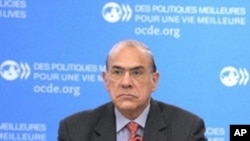The Paris-based Organization for Economic Cooperation and Development sliced its growth forecast for 2011, as a new report found recovery from the world economic crisis slowed down this year.
At a Paris press conference, OECD chief Angel Gurria said world growth has hit what he described as a "soft patch."
"Output and trade growth have both softened as support from fiscal stimulus and other temporary factors have faded," Gurria said. "The slowdown was expected. We already had it in our numbers since last May but at least in the OECD area, it was more pronounced than we previously thought."
Under the OECD's revised figures for 2011, the global economy will grow 4.2 percent next year instead of 4.5 percent predicted last May. In its new semi-annual economic outlook, the group predicts growth will recover in 2012 to 4.6 percent. Growth for the OECD's 33 member states -- which include the world's most advanced economies -- will be more modest at 2.3 percent next year and 2.8 percent in 2012. The U.S. marks the most dramatic slowdown, with its economy growing only 2.7 percent this year instead of an expected 3.2 percent.
Gurria described what he called "downside risks" -- including concerns that U.S. ad British housing prices could further decline and high public debt in some countries.
Gurria's remarks come as concerns grow in Europe about the high public debts of Ireland and Portugal. Another ailing economy, Greece, received a massive bailout package earlier this year.
Unemployment for OECD members is also expected to remain high at 7.5 percent by the end of 2012.
Gurria said it was important that governments adopt sound economic reforms.
"Well-designed and well-implemented reforms yield a triple dividend: they lift output and employment; they strengthen public budgets and they rebalance global demand," Gurria said.
But he added that world economies might get some good news - including chances that strong corporate earnings could boost investments.
OECD Predicts Less Global Economic Growth in 2011
- By Diaa Bekheet





